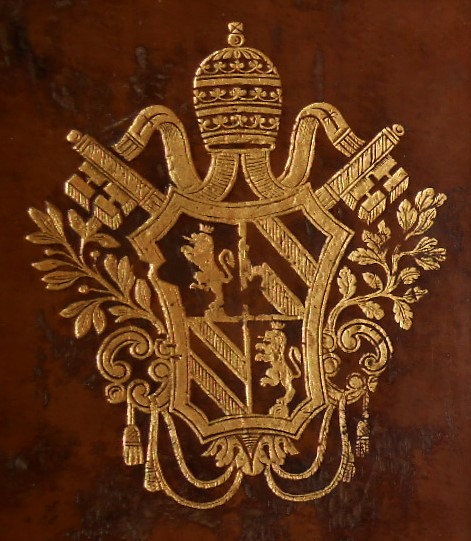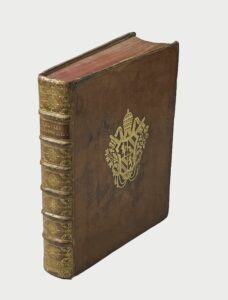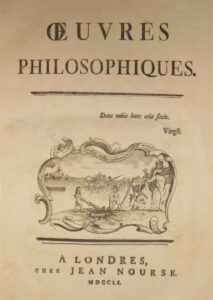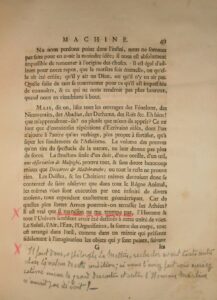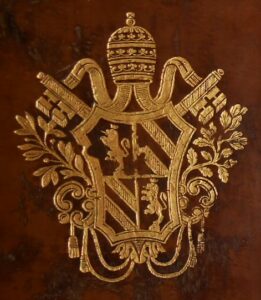Julien Offray de La Mettrie. Œuvres philosophiques. Londres [i.e. Berlin], Jean Nourse, 1751. In-4°. lvi, 364 pp. Vignette engraved on the title page with “Si prodire vetas, intus vehementior ardet ” on the phylactery. Contemporary fawn-coloured calf, back with 6 decorated raised bands, p. fawn-coloured morocco label, golden arms on the covers framed in a blind fillet, blind fillet on cuts, handmade endpapers, red edges.
Rare first edition of these Œuvres philosophiques published at his death, including six “Memoirs to serve the Natural History of Man”, the 2th at 6th having their own false title included in the pagination. The book was republished the following year., then, increased, in 1774 and in 1796.
The copy opens on 56 Opening Speech pages, and 8 pages for editor’s warning and dedication to Haller, then follow L’Homme machine (pp. 9 to 80), the traité de l’âme (pp. 81 to 208), the Abrégé des systèmes pour faciliter l’intelligence du Traité de l’âme (pp. 209 to 248), L’Homme plante (pp. 249 to 272), Les Animaux plus que machine (pp. 273 to 326), and finally the Systême d’Epicure (pp. 327 to 364).
Because of his uncompromising atheism, all of La Mettrie’s writings were put on theIndex from 1770 (Index librorum prohibitorum […] Pii septimi, Rome, 1819, p. 206) and systematically banned in France (Drujon, Catalogue des ouvrages, écrits et dessins de toute nature poursuivis, supprimés ou condamnés depuis le 21 Octobre 1814 jusqu’au 31 July 1877, p. 289).
His most important book, L’Homme machine, anonymously published in 1748, was burned by the magistrates of Leiden in Holland. Our edition of Œuvres philosophiques contains the final revision of theHomme machine, from which all subsequent editions have been taken. It has often been reissued as soon as 1752.
La Mettrie’s theories, materialists and epicureans, were vigorously opposed by Rome. Our copy is extensively annotated later in French, probably by a stranger, if we consider spelling and syntax mistakes.
Many passages are sidemarked with a red pencil by crosses or a braces, and sometimes followed by comments written in gray pencil, very critical, such: “It is therefore necessary to, O philosopher La Mettrie, seek above all else the value of this condition [If my reason does not deceive me] ; if you had done so you would have better estimated the great Descartes and certainly l’Homme machine would not have been written! ” (p. 49), or “Precisely I am looking for those philosophers who have shown that to think is to feel., but I confess that I did not find any! ” (p. 68) , or ” This is a book that does not yet explain that judging is feeling.! ” (p. 170), or “It is rather to present your explanation that you have to be blinded; because if the components do not [for have not] not these properties ever the compound will have them. – because if an âtome does not think how a hundred million shall they think?? ” (p. 246).
It is piquant to note that Pope Pius IX (Giovanni Maria Mastai Ferretti, 1792-1878), had his arms affixed to the copy of this sulphurous work blacklisted since 1770!
Pope from 1846 to 1878, liberal at the beginning of his pontificate, until 1848, then very conservative, author of the Syllabus and the encyclical Quanta cura, that condemns all forms of modernism in the Church, Pius IX proclaimed the dogma of the Immaculate Conception and convened the First Vatican Ecumenical Council, which defined papal infallibility.. Would he have had his arms affixed to the copy at the beginning of his pontificate?, and would he then have it, or during his studies, itself annotated, wondering, to better fight them, about the materialist theories developed by Hegel and taken up by Marx?
Stoddard, Julien Offray de La Mettrie. A Bibliographical Inventory, 55 ; Tchermerzine, VI, 468 has ; Quérard, La France littéraire, IV, 496 ; DSB, VII, 605-607 ; Garrison-Morton, 586; Haskell Norman 1270.
Small tear to the title without lack, discreetly restored, cleverly restored binding.
Beautiful copy of this rare edition with the most surprising provenance.
5 000 €
